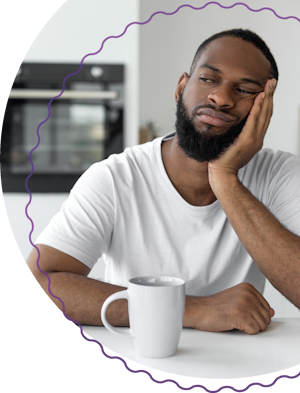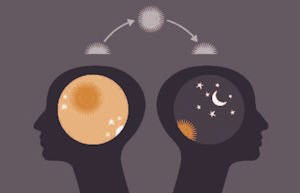Tired But Wired: Sleep and ADHD
Marlee Boyle, RRT
Download PDF
 It’s 11:30 pm, and after a long day, you crawl into bed, ready to rest. But as soon as your head hits the pillow, your mind starts racing. Thoughts bounce from one to another, keeping you wide awake, and before you know it, hours have passed without sleep. Then, just as you finally drift off, the alarm goes off—another day begins, and once again, you wake up tired. For many people with ADHD, this is an all-too-familiar scenario.
It’s 11:30 pm, and after a long day, you crawl into bed, ready to rest. But as soon as your head hits the pillow, your mind starts racing. Thoughts bounce from one to another, keeping you wide awake, and before you know it, hours have passed without sleep. Then, just as you finally drift off, the alarm goes off—another day begins, and once again, you wake up tired. For many people with ADHD, this is an all-too-familiar scenario.
Sleep and ADHD share a complicated relationship that goes beyond the simple struggle to fall asleep. From difficulty staying asleep, to waking up exhausted, the connection between ADHD and sleep is crucial for understanding how ADHD symptoms affect daily life.
Sleep is a vital part of our lives, yet it’s something many of us don’t fully understand. Each night, we cycle through several stages of sleep—REM (rapid eye movement) and non-REM sleep—both playing a role in physical restoration, emotional regulation, learning, and memory consolidation.
When sleep is disrupted—whether from not getting enough sleep, waking too early, or having poor sleep quality—these processes don’t happen effectively. The ADHD brain is particularly sensitive to sleep deprivation, leading to a vicious cycle that can make managing ADHD symptoms even harder.
This cycle of sleeplessness and worsening ADHD symptoms can be debilitating, but it doesn’t have to be the final word. Research and treatment approaches offer hope for breaking the cycle.
ADHD and sleep: a double-edged sword
While sleep deprivation affects everyone, it has a more pronounced impact on people with ADHD. Executive functions like attention, working memory, and emotional regulation, which are already challenging for those with ADHD, are further impaired by lack of sleep. When sleep is disrupted, it exacerbates ADHD symptoms, leading to poorer focus, greater emotional reactivity, and increased impulsivity.
Two processes regulate our sleep: Process S, a homeostatic system that builds sleep pressure the longer we stay awake, and Process C, the circadian rhythm, which follows a twenty-four-hour cycle. These processes work together to help us fall asleep and regulate our sleep-wake cycle. However, ADHD can interfere with both processes.
 Research shows that people with ADHD often experience delayed circadian rhythms, meaning their natural sleep-wake cycle is shifted later. Many adults with ADHD are naturally “night owls,” feeling alert in the evening when most people are winding down.
Research shows that people with ADHD often experience delayed circadian rhythms, meaning their natural sleep-wake cycle is shifted later. Many adults with ADHD are naturally “night owls,” feeling alert in the evening when most people are winding down.
For those with ADHD, factors like stimulant medications, caffeine, and even daytime napping can disrupt sleep pressure (Process S). Stimulants, while helpful for managing ADHD, stimulate the central nervous system, reducing sleepiness. Caffeine can delay sleep onset by blocking adenosine, the neurotransmitter responsible for making us feel sleepy, preventing the buildup of sleep pressure. Napping or sleeping in too long during the day can reset the sleep drive, making it harder to feel sleepy when it’s time to rest.
The hidden sleep disorders affecting people with ADHD
Sleep problems don’t stop with a delayed sleep phase disorder. Adults with ADHD are also at higher risk for a variety of sleep disorders, including:
- insomnia
- sleep-disordered breathing, like obstructive sleep apnea
- restless leg syndrome (RLS)
- narcolepsy
Tackling sleep issues: what actually works?
While sleep hygiene—like maintaining a consistent schedule and avoiding caffeine—can help mild sleep disturbances, it’s not effective for those with chronic insomnia. Sleep hygiene doesn’t address the neurobiological or psychological factors contributing to insomnia, and people with ADHD may struggle to follow these routines due to executive function challenges. Cognitive behavioral therapy for insomnia (CBT-I) is more effective, as it targets the root causes of sleep issues.
Cognitive behavioral therapy for insomnia is the gold standard treatment. CBT-I focuses on changing the thoughts and behaviors that interfere with sleep. It’s an evidence-based, non-pharmacological treatment that has shown to be effective for chronic insomnia and sleep issues associated with ADHD.
CBT-I has proven effective for people with ADHD, improving both sleep quality and daytime functioning. It can reduce the time it takes to fall asleep, increase total sleep time, and improve overall sleep efficiency. CBT-I consists of five main components: cognitive restructuring, sleep consolidation, stimulus control, relaxation practice, and sleep hygiene.
Tailoring CBT-I for ADHD
Since ADHD presents unique challenges—such as difficulty sticking to routines, poor organization, and distractibility—CBT-I programs can be adapted to meet the needs of individuals with ADHD. For example, shorter, weekly sessions (about an hour or less) help participants stay engaged without feeling overwhelmed. Virtual programs also offer convenience, removing logistical barriers like scheduling and transportation.
In addition, digital tools like sleep-tracking apps or reminders can be integrated into CBT-I, helping individuals with ADHD stay on track and monitor their progress. And before diving into the full CBT-I program, some people with ADHD benefit from circadian rhythm entrainment, which helps adjust their sleep-wake cycle to a more regular schedule.
Changing the narrative around sleep and ADHD
 Individuals with ADHD aren’t “bad sleepers” by nature; we’re simply dealing with neurobiological differences that affect how our brains experience sleep. The key is recognizing sleep struggles as a challenge that can be addressed, rather than a personal flaw.
Individuals with ADHD aren’t “bad sleepers” by nature; we’re simply dealing with neurobiological differences that affect how our brains experience sleep. The key is recognizing sleep struggles as a challenge that can be addressed, rather than a personal flaw.
By prioritizing sleep health and utilizing targeted, evidence-based treatments like CBT-I, people with ADHD can break the cycle of sleeplessness and improve their overall quality of life. Better sleep isn’t just about resting more—it’s about unlocking the energy, focus, and emotional balance necessary to thrive with ADHD.
Sleep is not the enemy. It’s an ally that we need to lead more successful lives with ADHD.
 Marlee Boyle is a registered respiratory therapist with a certification in clinical sleep health. With nearly a decade of experience working in a sleep disorder lab and clinic, she developed a deep understanding of sleep-related issues, particularly in populations affected by sleep deprivation. This experience led her to co-found Sleep Works with two of her best friends. After being diagnosed with ADHD as an adult, Boyle’s career has evolved from helping individuals improve their sleep quality to focusing on those with ADHD, a condition she finds closely linked to the sleep struggles she spent years addressing. Her approach is rooted in evidence-based strategies from behavioral sleep medicine, which she adapts to support individuals with ADHD, particularly in managing the challenges posed by executive function difficulties. Passionate about improving the lives of those affected by ADHD, Boyle combines her expertise in sleep and her understanding of neurodiversity to create tailored, effective sleep solutions.
Marlee Boyle is a registered respiratory therapist with a certification in clinical sleep health. With nearly a decade of experience working in a sleep disorder lab and clinic, she developed a deep understanding of sleep-related issues, particularly in populations affected by sleep deprivation. This experience led her to co-found Sleep Works with two of her best friends. After being diagnosed with ADHD as an adult, Boyle’s career has evolved from helping individuals improve their sleep quality to focusing on those with ADHD, a condition she finds closely linked to the sleep struggles she spent years addressing. Her approach is rooted in evidence-based strategies from behavioral sleep medicine, which she adapts to support individuals with ADHD, particularly in managing the challenges posed by executive function difficulties. Passionate about improving the lives of those affected by ADHD, Boyle combines her expertise in sleep and her understanding of neurodiversity to create tailored, effective sleep solutions.
REFERENCES AND ADDITIONAL READING
https://www.sleepfoundation.org/mental-health/adhd-and-sleep
Borb AA, Achermann P. Sleep Homeostasis and Models of Sleep Regulation. Journal of Biological Rhythms. 1999;14(6):559-570. doi:10.1177/074873099129000894
Hvolby A. Associations of sleep disturbance with ADHD: implications for treatment. Attention Deficit Hyperactivity Disorder. 2015 Mar;7(1):1-18. doi: 10.1007/s12402-014-0151-0. Epub 2014 Aug 17. PMID: 25127644; PMCID: PMC4340974.
Wajszilber D, Santiseban JA, & Gruber R. (2018). Sleep disorders in patients with ADHD: impact and management challenges. Nature and Science of Sleep, 10, 453–480. https://doi.org/10.2147/NSS.S163074
Other Articles in this Edition
The Impulsive Friendship Cycle
The State of ADHD Advocacy: Progress, Challenges, and How You Can Take Action
How to Help Your Daughter Manage Executive Dysfunction
Seeing ADHD in Full: Permission as a Foundation of ADHD Care
Tired But Wired: Sleep and ADHD
